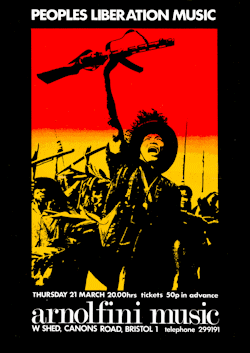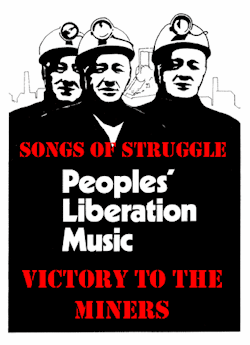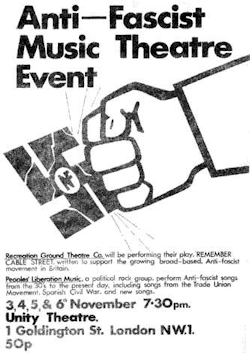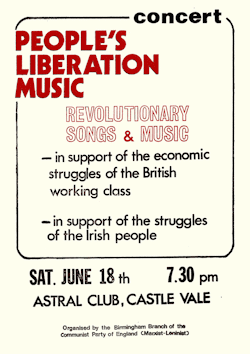Posted June 11, 2008
Cornelius Cardew lived a singular life in modern music. He helped give birth to electronic music in the 1950’s, connected the U.S. and European musical avant-gardes, and pushed the limits of improvised music with groups such as AMM. From the mid 1950’s through the early 1970’s Cardew burned like a comet, redefining experimental music and earning legend status. But when his commitment to Marxist politics intensified he left it all behind to create “people’s liberation music”.
Electronic Music and Minimalism
For our purposes here we will look at ‘both sides’ of Cardew’s life and music, although it is unwise to compartmentalize such a complex human being.
Cardew followed a boyhood passion for classical music all the way to the Royal Academy of Music. But it was his gig after graduation that put him in a nexus of ground breaking music. At the age of 22 Cardew traveled to Germany to work as the assistant to composer Karlheinz Stockhausen. Stockhausen was opening up a new world of music making machinery, electronically generated sounds, and compositions that made full use of these developments. Their close creative relationship lasted for three years.
 There were creative forces having an even greater impact on the young Cardew than Stockhausen and electronic music. Cardew visited the United States in the late 1950’s and attended a series of performances that would change his entire artistic trajectory. The U.S. composers John Cage and David Tudor were working at the height of their creative powers, incorporating chance, atypical instrumentation, and performance art into their compositions and public performances. Cardew’s encounter with their music was shattering for him. There was something unmistakable happening in the U.S. avant-garde and Cardew connected with it tremendously.
There were creative forces having an even greater impact on the young Cardew than Stockhausen and electronic music. Cardew visited the United States in the late 1950’s and attended a series of performances that would change his entire artistic trajectory. The U.S. composers John Cage and David Tudor were working at the height of their creative powers, incorporating chance, atypical instrumentation, and performance art into their compositions and public performances. Cardew’s encounter with their music was shattering for him. There was something unmistakable happening in the U.S. avant-garde and Cardew connected with it tremendously.
Soon Cardew would act as a bridge between U.S. composers and British composers. He solidarized with what was becoming known as Minimalism, including the work of drone specialist Lamonte Young. Embracing more than just Cage, Cardew connected with the entire web of fellow travelers: Christian Wolff, Morton Feldman, Earl Brown, as well as dancer and choreographer Merce Cunningham. Cardew was also very impacted by the extent to which these composers were connected to the visual arts. Cage was connected to painters Jasper Johns and the recently deceased Robert Rauchenberg, Feldman was hooked up with a number of Abstract Expressionists, and Young was an active member of the iconic art group Fluxus.
[Speaking of cross-movement explorations, Christian Wolff has a long history with the anti-capitalist left. He once named a composition after Trotskyist writer Harry Braverman and maintains an affinity for the Industrial Workers of the World.]
Free Improvisation
Never one to sit still, Cardew’s focus was drawn once again to a new field of endeavor. The mid-1960’s offered a plethora of ways to create entirely improvised music. There was of course the avalanche initiated by African American musicians coming from the jazz tradition such as John Coltrane and Cecil Taylor. Simultaneously there was an upheaval of improvised music throughout Europe, with some players coming out of jazz and others out of the traditional avant-garde. ‘Free Improvisation’ was the order of the day, and Cardew’s latest project was out at the front.
 Cardew’s group AMM—which included long time collaborator and guitar explorer Keith Rowe—was the vehicle for some of Europe’s most adventurous improvised music of the 1960’s. Using electronic and acoustic instruments AMM pushed the limits of sound and collective creativity. It is important to stress the collectivity of AMM and the projects that immediately followed it. This was music that was composed on the spot, with equal input from all participants. AMM, a later the Scratch Orchestra, was an experiment not just in musical improvisation but also in radical democracy. For any of these projects to work, the artists essentially had to approach music composition with a socialist attitude. Scratch Orchestra built on this radical democratic perspective, and also began to include Cardew’s inventive visual scores and an open door policy to membership. The group grew out of one of Cardew’s teaching gigs, although the ethos was to challenge the role of the teacher. His philosophy on band leadership was sometimes described as “reverse seniority”.
Cardew’s group AMM—which included long time collaborator and guitar explorer Keith Rowe—was the vehicle for some of Europe’s most adventurous improvised music of the 1960’s. Using electronic and acoustic instruments AMM pushed the limits of sound and collective creativity. It is important to stress the collectivity of AMM and the projects that immediately followed it. This was music that was composed on the spot, with equal input from all participants. AMM, a later the Scratch Orchestra, was an experiment not just in musical improvisation but also in radical democracy. For any of these projects to work, the artists essentially had to approach music composition with a socialist attitude. Scratch Orchestra built on this radical democratic perspective, and also began to include Cardew’s inventive visual scores and an open door policy to membership. The group grew out of one of Cardew’s teaching gigs, although the ethos was to challenge the role of the teacher. His philosophy on band leadership was sometimes described as “reverse seniority”.
Cardew and Marxism
It is not surprising that this milieu of musicians became interested in the pronouncements and declared intentions of the Great Proletarian Cultural Revolution happening in China. Before long Cardew—who had long sought radical egalitarianism through improvisation—was hosting study groups with other composers and musicians on the work of Mao Tse Tung.
Cardew and his collaborators were specifically drawn to Mao’s “Yenan Forum on Literature and Art” from 1942. This book insists that art and music be directly at the service of the working class and revolutionary movements. This was not a unanimous view amongst Marxists involved with the arts, with some left artists finding this perspective limiting. Many of Cardew’s admirers thought he was already making radical, egalitarian music that shook up the system. But increasingly Cardew was not satisfied with shaking up the art world; he wanted to make music tailored to class struggle.
Attempting Marxist Music
If art should be created to serve revolutionary movements, then what movement was the Scratch Orchestra supporting? Well, none really. AMM did not actively support radical politics, neither did Minimalism, or electronic movement, or much of the avant-garde at all. So Cardew said farewell to all that.
As the 1970’s progressed Cardew focused increasingly on making explicitly political music. At first it was simply politically themed song titles, next was the introduction of more pop and folk composition styles, and finally the appearance of lyrics in Cardew’s compositions.
 An aspect of Cardew’s new musical and ideological turn was his interest in folk music. One way Cardew would show support for the Irish struggle, for example, was to incorporate Irish folk themes into compositions. Another aspect was the move towards making the music slightly more accessible and less abstract. Cardew started playing and recording slight off-kilter, romantic pop and folk ballads on piano. The lyrics fully cemented the political content of his work, with no guessing left as to his politics.
An aspect of Cardew’s new musical and ideological turn was his interest in folk music. One way Cardew would show support for the Irish struggle, for example, was to incorporate Irish folk themes into compositions. Another aspect was the move towards making the music slightly more accessible and less abstract. Cardew started playing and recording slight off-kilter, romantic pop and folk ballads on piano. The lyrics fully cemented the political content of his work, with no guessing left as to his politics.
There is of course a long tradition of lyrical leftists, from Joe Hill to Sweet Honey in the Rock to David Rovics. But Cardew was trying for something quite different. While the aforementioned artists generally articulate left politics broadly defined and in easily accessible terms, Cardew sought dense, hyper political lyrics that graphically spelled out the intricacies of his organization’s political line. This was at the height of the 1970’s Leninist party-building movement in England and around the world. Communicating the organizations positions was to become a central aspect of Cardew’s work.
The Marxist formation Cardew and his co-thinkers had hooked up with was called the Communist Party of England (Marxist-Leninist). They had begun as enthusiastic supporters of revolutionary China but had broken with China after its political rift with Albania. Albania had long been an ally of China and many far-left China supporters stayed loyal to Albania after the break. These comrades believed there was a revolutionary continuity that connected the tradition of Lenin, the rule of Joseph Stalin, the ideology of Mao Tse Tung, and that of Albania’s Communist leader Enver Hoxha. For Cardew and his comrades every socialist country had finally fallen to revisionism—given up on the necessity of revolution—except Albania, the last true anti-revisionists.
Like Mao and Hoxha, Cardew believed that the USSR was also an imperialist country alongside the United States. His lyrics sneer at Soviet foreign policy, even the aspects supported by leftists. Nevertheless, Cardew’s political thinking must be admired for it’s loyalty to idea that revolution is possible. Cardew’s comrades also championed the Irish struggle while performing and living in England in the darkest days of the 1970’s. Cardew and his comrades were the truest of true believers, and selflessly dedicated.
It must be emphasized the extent to which national liberation in Ireland was dear to Cardew and central to his later work. Even on the far left it could be uncomfortable to be an unconditional supporter of Ireland’s right to self-determination by any means necessary while living in Britain in the 1970’s. Cardew was upfront and fearless. He recrafted classic Irish republican ballads, wrote new songs about the struggle, and performed in Ireland as part of a “tour in support of the Irish peoples fight”.
 Unsurprisingly, his shows in the south of Ireland were in union halls, his shows in the north were in republican neighborhoods. Playing to republican crowds in West Belfast or performing in union halls or at demonstrations was a key aspect of Cardew’s attempt to bring his music to the front lines of the struggle. The band created in this period was called People’s Liberation Music and they cohered around the idea of making Cardew’s revolutionary songs mobile. Over nearly a decade they performed—with Cardew directing the band and playing piano—at countless anti-fascists and pro-labor demonstrations.
Unsurprisingly, his shows in the south of Ireland were in union halls, his shows in the north were in republican neighborhoods. Playing to republican crowds in West Belfast or performing in union halls or at demonstrations was a key aspect of Cardew’s attempt to bring his music to the front lines of the struggle. The band created in this period was called People’s Liberation Music and they cohered around the idea of making Cardew’s revolutionary songs mobile. Over nearly a decade they performed—with Cardew directing the band and playing piano—at countless anti-fascists and pro-labor demonstrations.
But there is an undeniable awkwardness to the Cardew’s songs in the People’s Liberation Music era. The songs buckled under the weight of the unmusical, hyper political lyrics. Basing the lyrics to a “pop” song on a speech by Chairman Mao (literally putting a speech to music) does not make for a particularly artful of compelling listening experience. Those who are familiar with the “Socialist Realism” painting style of the Stalin era will immediately recognize the strident, thrusting kitsch-Marxism portrayed in Cardew’s lyrics. Upon listening to the Peoples Liberation Music band you begin to wonder if this giant of the avant-garde isn’t wasting his talent. Cardew had been so searingly creative, so willing to work outside conventional musical norms, that to hear him creating quaint orchestral pop with unlyrical lyrics is an artistic disappointment. Basing his work on some strange conception of what “the people” could best relate to, he ends up with music that lands somewhere between a 70’s Broadway musical and an overzealous community church choir.
But strangely it somehow works. Cardew is so sincere, he so desires to put his talents at the service of revolution that the songs eventually win you over. Kitschy, heavy-handed, and sometimes poorly written, the songs of Peoples Liberation Music are a fun and fascinating way to look inside the vibrant and varied Marxist left of the 1970’s.
Cornelius Cardew was run over by a car while walking near his home in London in 1981. No one was ever arrested and it is widely believed that he was assassinated.
Here are some key Cornelius Cardew compositions from various periods of his life.
Download some music by Cornelius Cardew
1. Peoples Liberation Music “Smash the Social Contract”
This is a classic track from Cardew’s PLM project. The lyrics call out labor bureaucrats, Labour Party hacks, as well as the capitalists themselves in this tune about challenging an enforced ‘labor peace’. The song fits PLM’s mold for songwriting perfectly: triumphant chorus and an immense amounts of words.
2. Cornelius Cardew “Long Live Chairman Mao”
Taking on romantic, early 20th century melodies Cardew pays tribute to a leading light of the anti-revisionist movement. He hasn’t introduced the cumbersome lyrics of the PLM period, but his communist intentions are perfectly clear. This song comes from the early 1970’s.
3. Cornelius Cardew “Memories of You”
This track is taken from Material, Cardew’s ground breaking album from the early 1960’s. He weaves together elements of chance, minimalism and repetition, and free improvisation. You can hear the living connection between Cardew, Cage, the Fluxus movement, and the chance aesthetics of the early 60’s.
4. Peoples Liberation Music “There Is Only One Lie, There Is Only One Truth”
Oddly, this song lists a whole hosts of lies: revisionism, opportunism, reaction, and imperialism to name a few. If you’ve ever wanted to hear a church choir interpret the politics of Stalin’s ‘Third Period’, then here you go. It’s somewhere between painful, corny, and still strangely reassuring. There is a comforting certainty to Cardew’s vision of “the science of Marxism-Leninism”, as unnuanced and nonscientific as it sometimes sounds.
5. AMM “What Is There In Uselesness To Cause You Distress”
Cardew is found here building drones on top of drones, spiraling into a trance of gray fuzz. He connects electronic instrumentation to the freely evolving ethos of improvisation. Although now a regular part of the experimental music pallet, these fuzzy drones and electronic washes were new sounds in music and art at the time, with AMM pioneering much of this approach.

Comments
4 responses to “Mp3 Spotlight: Cornelius Cardew”
Speaking of Tilbury, he gives his reason why he no longer performs in the United States here:
http://incalcando.com/tilbury/
It is not accurate to refer to AMM as “Cardew’s group”.
The original AMM line-up was Rowe on guitar, Lou Gare on saxophone, and Eddie Prévost on drums. When AMM split for the first time, Cardew and Rowe left to do their weird Maoist-populist “people’s music” thing, and Gare and Prévost moved towards a more “traditional” free jazz approach, continuing to use the AMM moniker.
Also, while you correctly state that AMM “did not actively support radical politics”, it should be noted that AMM drummer Eddie Prévost certainly has very interesting things to say about the social and political ramifications of improvised music in his two books, “No Sound Is Innocent” and “Minute Particulars”.
Finally, a lot of AMM afficionados (myself included) would maintain that the real “classic” AMM era is not the Cardew/Gare/Rowe/Prévost group of the 1960s, but rather the trio version of AMM with Rowe and Prévost along with pianist John Tilbury that existed throughout the 1980s and 1990s. For all intents and purposes, 60s AMM and 80s/90s AMM are too different group, but it is the latter version which is hugely influential on contemporary improvising musicians in Berlin, Tokyo, and London. John Tilbury has played here on numerous occasions in the last couple of years, and his spaced, Feldmanesque piano playing cannot be overrated in their influence.
Tilbury and Prévost continue to perform as AMM after Rowe’s hostile departure in 2004.
Those interested should check out the record label Matchless Recordings: http://www.matchlessrecordings.com
My personal favorites for AMM are “Newfoundland” and “Live in Allentown, U.S.A.” The post-Rowe recording “Norwich” is also nice.
understanding and sharing revolutionary culture (from the various traditions with all their complexities) along with the MP3s (or visual representations or ….)
is of utmost importance and so glad you incorporate this on the webpage and elsewhere. A vibrant socialist culture needs to accompany our political organizing; not just after “we arrive at socialism” but right here and now.
JLH “AKTIVEYTOR”
http://www.myspace.com/JesseLokahiHeiwa
When I say that Cardew made break with the Avant-Garde I mean it… he burned all his bridges.
Take his relationship with Karlheinz Sotckhausen. Cardew used Stockhausen as a stawman to attack the entire Avant-Garde, throwing a spear at his entire creative project in a book length essay called “Stockhausen Serves Imperialism” (available at UBU.com).
You can guess at the heart of the polemic. By choosing to turn his face away from the crimes of capitalism and imperialism, Stockhasuen was in fact embracing the status quo… there by letting capitalism and imperialism further destroy the planet and species. Stockhausen, Cardew insisted, was guilty of NOT putting his work at the service of the struggle.
At the time–and still to this day in many ways–Karlheinz Stockhausen represented the public face of experimental music and early electronic explorations.
Cardew knew full well that his attack against him would reverberate throught radical art millieus.
It’s a little heavy handed, but is a great essay to read.